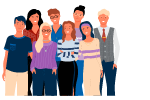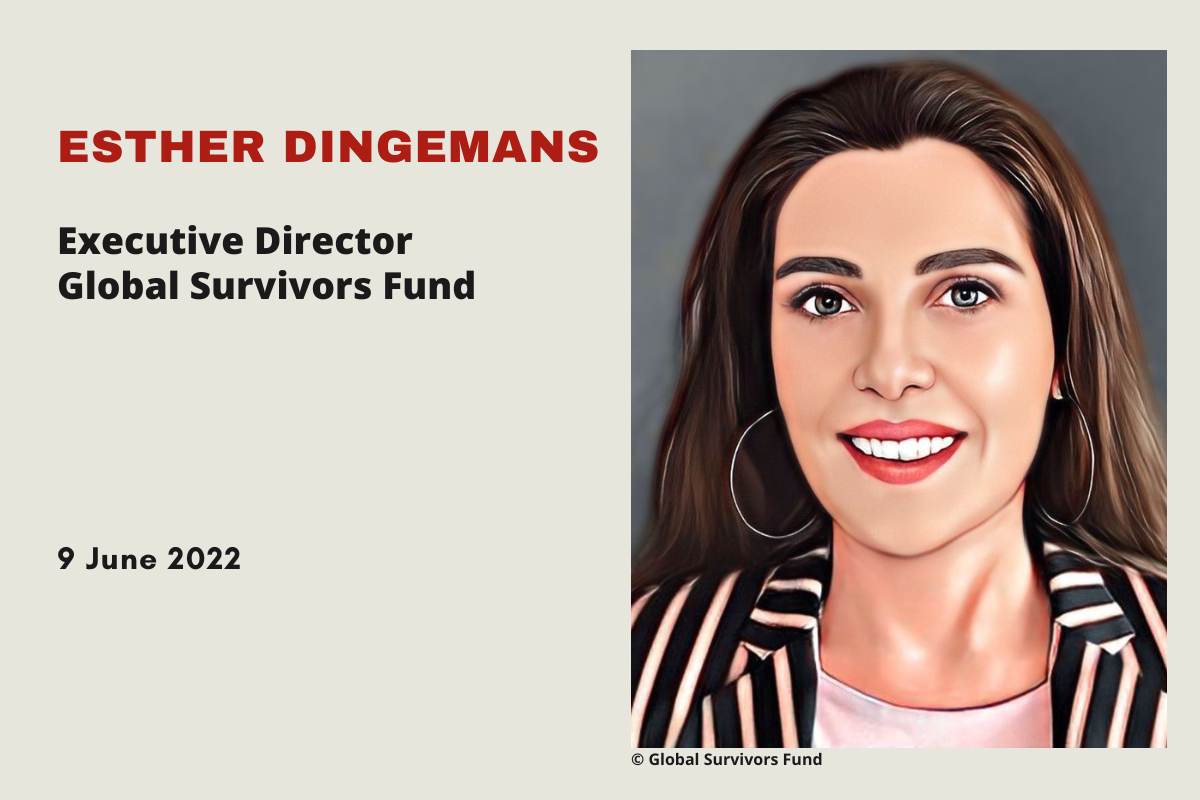The Interview | Esther Dingemans
 |
How would you present your organization in a few words? What is your role? What is your goal? |
I have the honour to lead the Global Survivors Fund (GSF) together with an excellent team, of mostly women. Our organisation was set up in 2019 by Dr Denis Mukwege and Nadia Murad, Nobel Peace Prize laureates. Our main goal is to support the highest possible number of survivors of conflict-related sexual violence across the world, and provide them with significant and concrete help so that they can rebuild their lives. This is so important; when sexual violence is used in conflict, it often serves as a very destructive weapon, causing tremendous destruction, in terms of physical injuries, trauma, stigmatization, broken family ties and complete loss of livelihood.
At GSF, we carry out our work from the perspective of “reparations.” Survivors of sexual violence are entitled to reparations by law – this means that they should receive an acknowledgement of the harm they have suffered, but they should also get compensation and access to rehabilitation services such as job-support, education, and long-term medical and psychological care. Having worked with survivors for more than 20 years, I unfortunately find that those who have received reparations are only a handful. A network of survivors of wartime sexual violence coming from around the world felt this had to change, and that’s why we set up GSF.
Part of what we do is to push governments to take responsibility and provide reparations themselves to survivors, and we support those governments that are genuinely willing to do that. But survivors cannot wait – they have often been waiting years, sometimes generations, for support. So, we start the process by providing them with concrete and direct support while involving governments. Our aim is to show that reparations are feasible and affordable, and that governments can do the same and scale up our efforts.
My role is to give strategic direction to the organisation to find ways to make things really work for survivors. Some of it is about challenging the status quo and pushing new boundaries, as we have seen that old structures and frameworks have not served survivors in accessing justice.
 |
Among the concentration of actors in Geneva (IOs, NGOs, permanent missions, academia, and the private sector), who do you work with and how? |
We collaborate with all kinds of actors. It is our strong belief that we can only help survivors and bring an end to this cruel practice by working together. For example, all our projects are carried out with survivors and actors on the ground, in conflict-affected areas and wherever we find interested partners across the world and here in Geneva. We also work with researchers, grassroots organisations, governments, as well as the private sector.
All our projects are developed with survivors in the driver’s seat, making sure that they have a voice in the decisions which affect them. For example, we have survivors present on GSF’s Board, alongside civil society actors and reparations experts.
 |
What are the strengths and weaknesses of Geneva with regards to the development of your activity? |
Geneva is an important hub for collaboration, and we can make the most of it by having access to this international melting pot for multistakeholder engagement. We feel that the international community is very interested in the topic, and we have been able to participate in events here such as the UN Human Rights Council. We also work with excellent students and researchers from different universities, as well as with the private sector. Geneva is definitely an inspiring place for a newly founded organisation like GSF!
Of course, we would like to move away from this centralised model, whereby big headquarters in one place are not accessible to all of those affected by sexual violence. Our aim is to support projects on the ground and work directly with survivors. That’s why we are moving towards having decision-making positions directly filled in those locations and hiring survivors in our global team.
 |
What do you think global governance should look like 20 or 30 years from now? |
In 20 or 30 years from now, I hope there will be much more equality between the organisations in Geneva and grassroots organisations across the world. For effective justice, organisations in conflict-affected settings need to have a much bigger role in their own decision-making process. We work with many grassroots organisations that would often not meet the criteria set by many international donors. We provide support to relieve them of some of the administrative burden. We accompany them for example on data protection, financial management, and the impact monitoring of the activities. Ultimately, we would like to make sure that these organisations can continue in full autonomy. I would like to see survivors’ networks leading on issues that affect them, without having to rely on international organisations or bodies.
To make this happen, we engage in co-creation, meaning that our work is not only for but also with survivors. We try to jointly innovate a new way of working based on the knowledge and skills of survivors and that of other experts through a wide range of disciplines. Survivors have a lead role in designing our projects according to their needs and preferences, and they are involved in the monitoring and the review of our projects. This requires a very flexible way of thinking, and we are proud to see it happening!
 |
What question would you like to have been asked? |
My hope is for a better understanding and for more visibility of the issue of conflict-related sexual violence. Although it is more frequently discussed today, we often fail to see all the reasons and the patterns behind this violence while it involves very violent rapes, including of small children, sexual slavery, sexual torture, with relatives often forced to watch the sexual violence. We avoid talking about these horrific details, but I feel that it is important to highlight these key aspects, as they are core to explain the profound harms and the urgency to support victims whose lives are often ruined. Victims lose their livelihoods, their health is deeply affected, like their intimate relationships, and it can take years and generations of trauma and continued violence to recover. With a growing movement against sexual violence around the world, I have hope that we are finally more ready to be there for the survivors, to show them they are heard and not to blame and to accelerate the process of rebuilding. This in itself is an essential step in eradicating sexual violence, globally.
